What France achieved
France contributes to disarmament in several ways :
Reduction and adaptation of the French nuclear arsenal in accordance with the principle of strict sufficiency
In accordance with the principle of strict sufficiency, the French arsenal is kept at the lowest level compatible with the strategic context, and the predictable evolution of the threats. France has thus reduced its nuclear forces and their strategic positionning.
The full dismantlement of the terrestrial component was achieved in 1998 :
– Pluton missiles were withdrawn as soon as 1991.The HADES weapons system was withdrawn and dismantled in 1997.
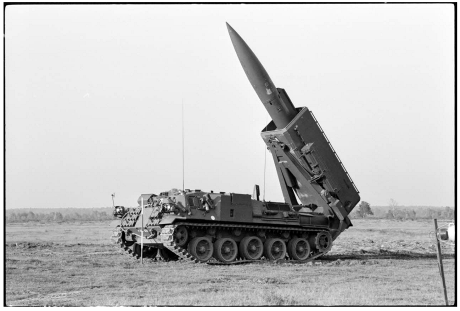
– Surface-to-surface ballistic missiles from the Albion plateau were fully and irreversibly dismantled in 1998, before the site was redesigned for civil purposes. France is the only country to have dismantled its nuclear surface-to-surface missiles systems.
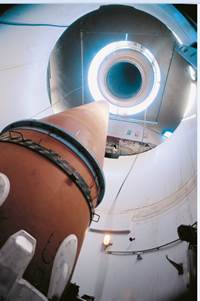
The maritime and airborne components were reduced by a third :
– The nuclear submarines were reduced from 6 to 4 since 1998
– The air fighter squadrons were reduced from 3 to 2 since 2010
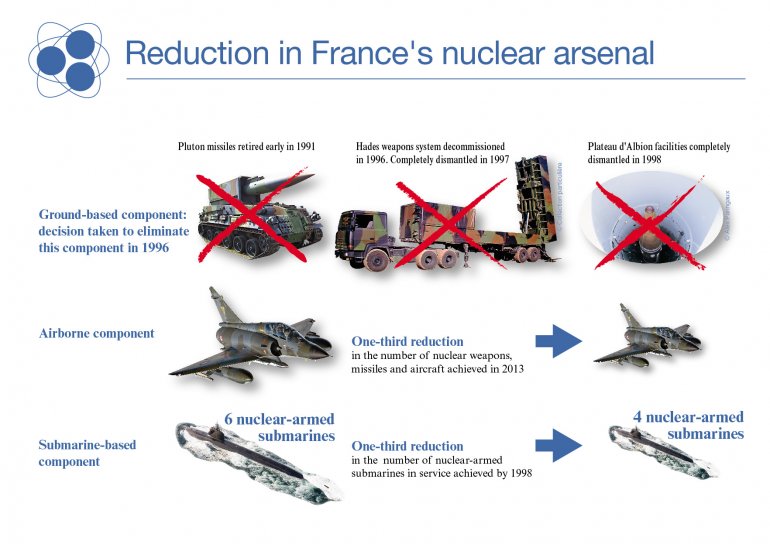
France has cut by half its arsenal in ten years. Furthermore, France is in favor of a reduction of the operational alert levels for the nuclear weapons systems, provided that the strategic context and the overall security condition allow. France took concrete and reliable actions in this direction :
– Reduction of the alert level of its two components in 1992 and 1996. These reductions of the alert status focused as much on the reaction delays of the nuclear forces than on the number of weapons
– De-targeting of the French nuclear weapons, announced in 1997 and fiercely reaffirmed since. It means that since 1997, no French nuclear weapon is targeted in advance to a specific target
Finally, France exercises governmental control over nuclear weapons and implements strict procedures to ensure that no weapon can be used without the order of the President of the Republic.
Strengthening transparency
Transparency measures have been carried out by France on the composition of its arsenal was as well as on nuclear doctrine and disarmament actions.
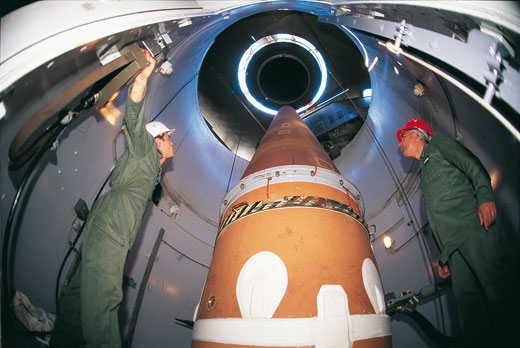
France is transparent about the composition of its nuclear forces :
– France made public its nuclear weapons ceiling (max. 300 nuclear weapons), and stressed that it has no other non-operational weapons. France is the first nuclear-weapons State to have stated publicly the total composition of its stockpile. The French President invited all the other nuclear States to do the same (including strategic and non-strategic weapons irrespective of their operational status)
– France revealed the composition of its nuclear stockpile : three sets of 16 submarine launched ballistic missiles, and 54 ASMP-A air-launched missiles. It is the first time France reveals this data, in a continuous transparency effort. France invites all nuclear weapon states to take the same transparency measures for all categories of nuclear weapons.
– Prior notification of all of France’s spatial and missile launches, and annual publication of a statement on all of our spatial and ballistic activities, accordingly with the Hague Code of Conduct against ballistic missiles proliferation (HCoC). France invites all the States to join and implement the HCoC.
Doctrine has been publicly and recurrently exposed (lastly in President’s speech on February 7th 2020). Its major points are also exposed in several documents :
– The white books on national defence and security (in 1994, 2008 and 2013) and in the National defence and security strategic review of October 2017.
– The reports annexed to the military planning laws
– The public speeches of the President and of the Prime Minister
France has transparently dismantled some of its nuclear facilities and keeps a clear record of its disarmament efforts :
– Opening of the nuclear testing site in the Pacific to an international expert mission to evaluate the effects of the French nuclear tests on the environment. It was an unprecedented step among the nuclear-weapons States. This mission resulted in an International Atomic Energy Agency (IAEA) report which stated that the site is entirely safe.
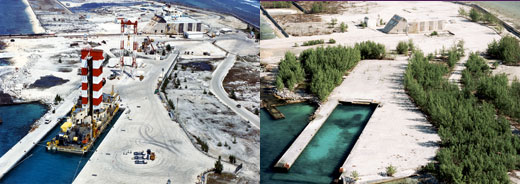
– International visits on previous nuclear weapon sites :
o On the previous facilities of fissile material production for nuclear weapons on the sites of Pierrelatte and Marcoule. Several visits were organized, the last one was held on February 5th 2020 for forty representatives of States member to the Conference on Disarmament.
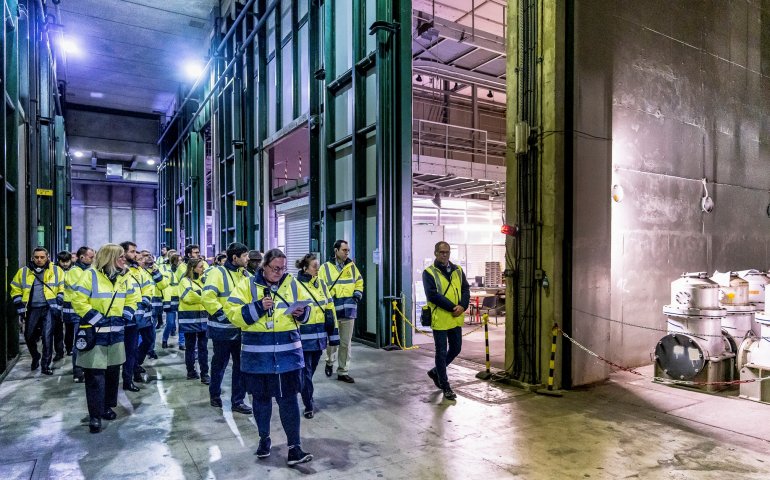
o On the Luxeil airbase in April 2015, of which the nuclear weapons stores are now empty.
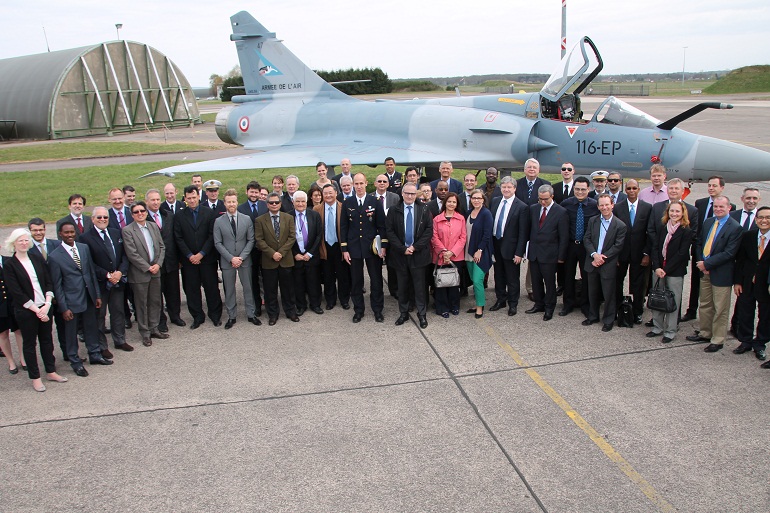
o On the Albion plateau on June the 18th of 2015, where the silos and SSBS missiles that used to be the surface-to-surface components were dismantled.
– The inspection by the IAEA of its civil enrichment facilities, in order to check they are not used for military purposes. The inspections on the Georges-Besse II facility are equivalent to the inspections conducted in the non-nuclear weapons States. Moreover, the processing plant of La Hague is the most inspected facility of all Europe.
– In the framework of the Treaty on Non-proliferation of Nuclear Weapons (NPT) France regularly publishes and broadcasts brochures on its disarmament efforts and reporting documents accordingly with the Plan of actions agreed by consensus during the NPT’s Review Conference of 2010. On 4 February 2020, France organized a seminar on transparency together with the Fondation pour la recherche stratégique (FRS). This seminar, which brought together 60 representatives of Governments and civil society, was an opportunity for France to present its national implementation report, in which the concrete actions taken to promote the comprehensive and effective implementation of the NPT are detailed, and collect feedback. Work was then undertaken to update this report to take account of the comments made during the seminar. Its revised version will be published in the run-up to the 10th NPT Review Conference.
All of these elements show France is involved in and for transparency, and call upon other nuclear weapon states to do the same . Indeed, the pursuit of disarmament is based on trust, which can only be built with transparency and reciprocity.
Banning nuclear tests and irreversibly dismantling the nuclear testing sites
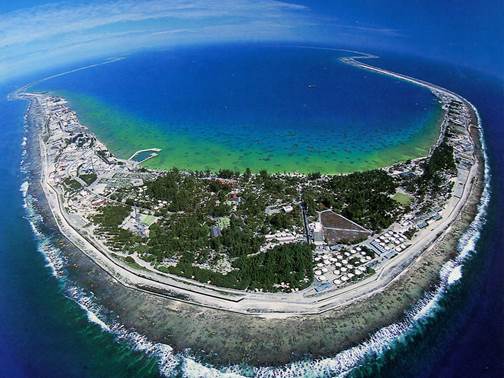
France announced the definitive end of its nuclear tests on 20 January 1996. France was the first NPT nuclear-weapons States, along with the United Kingdom, to ratify the Comprehensive nuclear Test-Ban Treaty (CTBT) in 1998. France was also the only nuclear-weapons State to have shut down and dismantled its nuclear test facilities : the experimental centre of the Pacific was dismantled inJuly 1998. France, with its EU partners, calls for the dismantlement of all nuclear test sites, in a transparentand open manner. Nowadays, France has not anymore facilities to realize nuclear tests. France contributes actively to the universalization of the CTBT.
Ending of the production of fissile material and irreversible dismantlement of the production sites
France has stopped since 1992 all of its plutonium production for nuclear weapons and extended this action in 1996 to its production of high-enriched uranium.
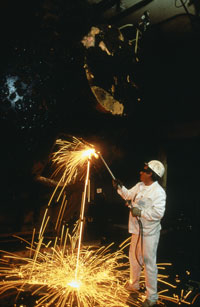
France is the first State to have decided in 1996 to close and dismantle its production facilities of Pierrelatte and Marcoule, which used to be producing fissile materials for nuclear weapons only. The dismantlement of these facilities is irreversible, as the representatives of member States of the Disarmament conference could check during their visit in 2020. Today, France does not have any facility to produce fissile material for nuclear weapons.
France has implemented a moratorium on the production of fissile material for nuclear weapons, and invites all the States that have such facilities to immediately and strictly respect this moratorium. It implies to end the production of fissile material for nuclear weapons, and to definitively shut down and dismantle the facilities or convert them, when possible, in civil nuclear purposes facilities.
Commitment to the next logical steps of disarmament : CTBT, FMCT, nuclear disarmament verification
In order to limit the qualitative improvement of nuclear weapons, France prioritizes the entry into force, as soon as possible, of the Comprehensiv nuclear Test-Ban Treaty (CTBT). France was the first NPT nuclear-weapons State with the United Kingdom to ratify the CTBT in 1998, and the only one to irreversibly dismantle its nuclear test sites. France and the EU promote the universalization of the CTBT, already signed by 184 States and ratified by more than 160, to accelerate its entry into force.
France is one of the main financial and technical contributors to the Comprehensive nuclear-Test ban Treaty Organisation (CTBTO). The CTBTO surveillance mechanism, which is completed at 90%, is an essential tool against proliferation, as the detection without delay of North Korea’s nuclear tests proves it. There are 16 surveillance stations on the French soil.
A quantitative limitation of nuclear weapons could be achieved through the Fissile Material production for nuclear weapons Cut-Off Treaty (FMCT). France promotes the launch at the Conference on Disarmament of negotiations on a FMCT. France already supported the resolution 71/259 during the 71st United Nations General Assembly creating a High level FMCT experts preparatory group (HLPG), “to consider and make recommendations on substantial elements of a future non-discriminatory, multilateral and internationally and effectively verifiable treaty banning the production of fissile material for nuclear weapons or other nuclear explosive devices, on the basis of CD/1299 and the mandate contained therein” . France has presented a FMCT project in 2015 at the Conference on Disarmament (courtesy traduction in English) 1. France continues to promote negotiations of a FMCT in this forum.
France also actively participates, with a twenties member States, to the International Partnership for the Nuclear Disarmament Verification (INPDV). This partnership addresses the technical aspects and challenges tied with the nuclear disarmament verification, pursuing objectives of exchanges and mutual comprehension of the issues implied by verification actions. It also aims at strengthening mutual trust between NPT nuclear-weapons States and non-nuclear States. In september 2019, France organised a field exercice with Germany (NuDiVe). France participated in the governmental group of experts (GGE) on disarmament verification.
Assistance to nuclear disarmament in the nuclear segment of the G7 global partnership
The Kananaskis Summit of 2002 implemented the G7 global partnership against the proliferation of nuclear weapons and related material. The initiative was conceived, at first :
(1) To assist the ex-USSR countries to dismantle and destroy their unconventional arsenals
(2) To secure fissile material
(3) To reassign scientists that used to be working on the military nuclear programs
This initiative was updated during the Muskoka Summit in 2010, and prolonged during the Deauville Summit in 2011. Extended to 31 countries and at the whole European Union, its mission consists mainly in implementing the UN Security Council Resolution 1540 against WMD acquisition by non-governmental actors.
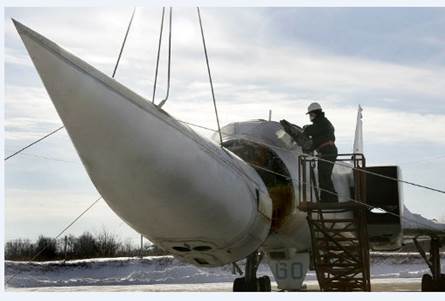
France dedicated huge financial and technical expertise resources for this initiative. For example, France allocated more than 46 M € to the safeguarding and evacuation of the worn nuclear fuel, and to the dismantlement of the nuclear reactors of two disarmed soviet submarines, on the Gremikha base in Russia. France also financed the return and retreatment of two high intensity radiological sources located in Lebanon and Sudan. France contributes to different IAEA projects concerning the repatriation of radioactive sources.
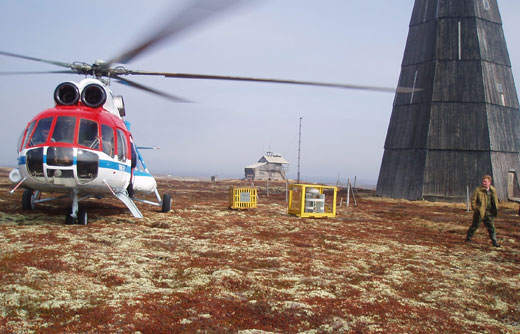
Actions to promote ballistic, chemical, biological and conventional disarmament and non-proliferation
Faithful to its own principles, France acts positively to promote conventional disarmament and actively fights ballistic and WMD proliferation (such as biological and chemical proliferation).
Regarding the fight against the proliferation of ballistic missiles, France is a party to several multilateral regimes for the control of missile technologies, which make it possible to subject the export of technologies and components of this type of delivery system to strict control, and thus to limit proliferation.
Regarding the issue of chemical weapons, France has been very early involved in fighting the use and proliferation of such unconventional weapons. France was the depositary of the 1925 Geneva Protocol, which prohibited the use at war of asphyxiating, toxic or similar gases, and of bacteriological resources. Almost universal, the Chemical Weapons Convention (CWC) of 1993 entered into force in 1997 and gathers 193 States Parties. It completes the Geneva protocols by prohibiting the development, the production, the acquisition, the storage, the detention and the transfer of chemical weapons. France supports the Organisation for the Prohibition of Chemical Weapons (OPCW) which implements the verification regime of the Convention.
To complete the CWC and OPWC mechanisms, the International Partnership against Impunity for the Use of Chemical Weapons was launched on January the 23rd of 2018 in Paris, by France.
The Partnership, gathering 24 countries and organisations, completes the international mechanisms against chemical weapons proliferation. It focuses on the impunity of the persons in charge having used chemical weapons. The States parties commit to collect all information on the perpetrators, to share the information with the relevant authorities (national or international) and to use all the possible remedies to sanction those who elaborate or use such weapons. Furthermore, the States Parties agree to publish on the partnership website a list of individuals and entities involved that have been sanctioned by the participating States or organizations. In 2019, France chaired the BWC Meeting of States Parties.
Regarding biological weapons, France actively participates to the works of the Biological Weapons Convention (BWC- Convention on the Prohibition of the Development, Production and Stockpiling of Bacteriological (Biological) and Toxin Weapons and on their Destruction). France focuses on two main axes : first promoting the BWC implementation and universalisation, and second, elaborating adequate measures to strengthen the regime and authority of this convention.
France attaches a great importance to effective chemical and biological disarmament, and so promotes the implementation of additional rules to evaluate the respect of the Convention by States parties. For this reason and since exports control is an effective instrument serving the CWC, France participates to the work of the Australia group.
France is committed to conventional disarmament, and thus signed and ratified both the Oslo convention prohibiting cluster munitions (2008) and the Ottawa convention prohibiting anti-personnel mines (1999). France focuses on pedagogy and promotion towards States in order to achieve the universalization of these conventions, and to ensure their effective implementation.
France also fights against small arms and light weapons (SALW) with several initiatives and treaties. France initiated the international initiative against illicit aerial transport of SALW, and initiated, jointly with Switzerland, the International instrument for tracing SALW (2005). France participates actively to the United Nations Programme of Action to Prevent, Combat and Eradicate the Illicit Trade in Small Arms and Light Weapons in All Its Aspects, and chaired its 3rd Review Conference in 2018. France also supports the universalization of the Arms trade treaty (ATT), adopted on April the 2nd of 2013, which sets rules aiming to achieve a responsible and transparent behaviour when transferring conventional weapons and to prevent their illicit trafficking.





